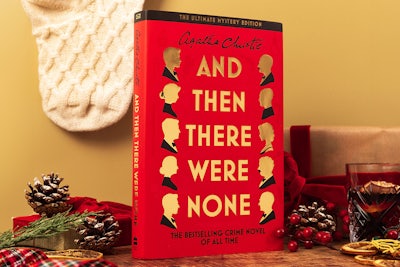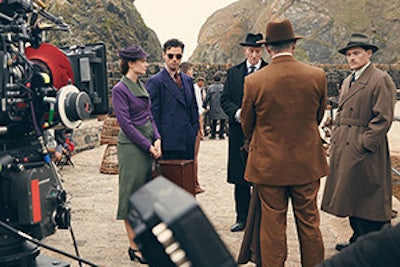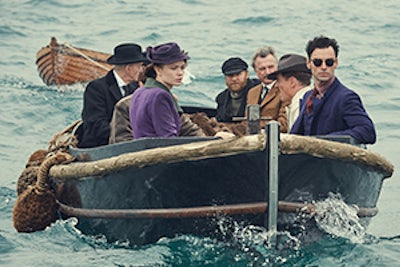And Then There Were None

1939. Europe teeters on the brink of war. Ten strangers are invited to Soldier Island, an isolated rock near the Devon coast. Cut off from the mainland, with their generous hosts Mr and Mrs U.N. Owen mysteriously absent, they are each accused of a terrible crime. When one of the party dies suddenly they realise they may be harbouring a murderer among their number.
The tension escalates as the survivors realise the killer is not only among them but is preparing to strike again… and again...
We’re not going to leave the island. None of us will ever leave. It’s the end, you see – the end of everything…
More about this story
Ten strangers arrive on an island invited by an unknown host. Each of them has a secret to hide and a crime for which they must pay. The strangers include a reckless playboy, a troubled Harley Street doctor, a formidable judge, an uncouth detective, an unscrupulous mercenary, a God-fearing spinster, two restless servants, a highly decorated general and an anxious secretary. One by one they are picked off. Who will survive? And who is the killer? Copies of an ominous nursery rhyme hang in each room, the murders mimicking the awful fates of its ‘Ten Little Soldier Boys’.
This is the story that made Agatha Christie the best-selling novelist of all time and is read the world over in more than 50 languages. “It was so difficult to do,” she writes, “that the idea had fascinated me.” It was an idea which is now the basis for many Hollywood horror films and has become a cliché to modern audiences, but it was Agatha Christie who was the first to do it and so successfully that the story has become her most adapted piece.
The whole thing is utterly impossible and utterly fascinating. It is the most baffling mystery Agatha Christie has ever written.
Christie began the adaptations, determined to challenge herself further by moving the story to the stage. It was performed in 1943 under the book’s original UK title, and the ending was changed as both she and the producers were concerned about leaving the audience on a low note. More recently in 2005, Kevin Elyot, screenwriter for many of the Poirot and Marple episodes, wrote a new version of the play, restoring the original ending of the novel and using the US title.
The first adaptation for cinema was in 1945 with René Clair’s seminal film. This escalated Christie’s stories to a whole new level and paved the way for an influx of adaptations, some of which Christie approved of and some which were made without her permission. 1949 saw And Then There Were None (again adapted under its original UK title) broadcast on the BBC, making it the first of Christie’s novels to appear on TV. Another British channel, ITV, produced their own version in 1959 and an American TV version was also made. Subsequent adaptations include the 1965 film by George Pollock (famed for the Margaret Rutherford Marple films) and the 1974 version by Peter Welbeck, the first to be made in colour.
The Hindi film Gumnaan in 1965 added Bollywood touches, including music and comedy, to the plot but was an unlicensed production which Christie had not approved. Similarly, a West German adaptation, Zehn kleine Negerlein, was directed by Hans Quest in 1969. In 1970 the story appeared on French TV and there was even a 1981 six-part adaptation made in Cuba. 1987 saw a Russian version titled Desyat' negrityat; this was rare in its use of the novel’s original ending. 1989 saw another US film, Ten Little Indians, directed by Alan Birkinshaw.
It was made into a PC game in 2005 by The Adventure Company, the first in a series of Agatha Christie games. The identity of the killer was changed and it was ported to Wii in 2008. In 2009 HarperCollins, Christie’s long-standing publishers,released a graphic novel adaptation and in 2010 BBC Radio 4 produced a full-cast 90 minute dramatisation.
The latest TV adaptation of And Then There Were None was released in the UK on BBC One in three parts, starting on the 26th December 2015. This latest incarnation returns to the dark roots of the story and is written by Sarah Phelps and produced by Mammoth Screen with Agatha Christie Productions. The all star cast includes Douglas Booth as Anthony Marston, Charles Dance as Justice Lawrence Wargrave and Aidan Turner as Philip Lombard.
Buy And Then There Were None
Other stories you might enjoy
Discover more about And Then There Were None

The Trivia Quiz
Do you have what it takes to score 100% on this quiz about the best-selling crime fiction book of all time?

10 Things You Didn't Know About the Story
Unexpected facts about the bestselling mystery novel of all time

Quotes from And Then There Were None
Explore key quotes and themes from And Then There Were None


 USA
USA 









